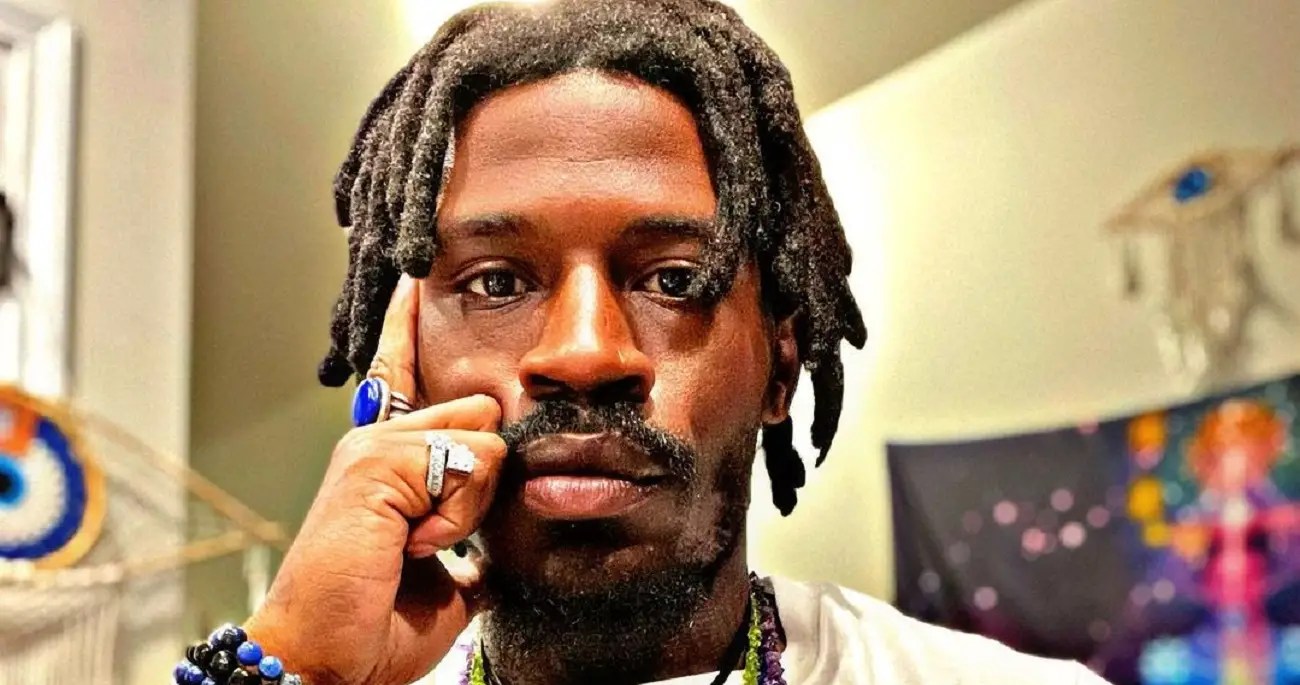Why Rashad Jamal Sentenced To Jail What
Why Rashad Jamal Sentenced To Jail What is a question being asked by many following the recent high-profile trial. Rashad Jamal, a former police officer, was found guilty of multiple charges, including murder and assault, and was sentenced to life in prison without the possibility of parole.
The case has garnered much attention due to the severity of the crimes and Jamal's status as a law enforcement officer. The trial was closely followed by the media and the public, and the verdict has sparked a debate about police brutality and the use of excessive force.
This article will explore the details of the case, including the charges against Jamal, the evidence presented at trial, and the impact of the verdict. We will also examine the broader issue of police brutality and the need for reform.
Why Rashad Jamal Sentenced To Jail What
Understanding the various aspects of "Why Rashad Jamal Sentenced To Jail What" is crucial to gaining a comprehensive perspective on the case. These aspects encompass the legal proceedings, the charges against Jamal, the evidence presented, the verdict, and the broader implications for law enforcement and society.
- Charges: Murder, assault, and other related offenses.
- Evidence: Witness testimony, physical evidence, and expert analysis.
- Trial: High-profile and closely followed by the media and public.
- Verdict: Guilty on all charges, sentenced to life in prison without parole.
- Police Brutality: Case has sparked debate about excessive force and police accountability.
- Legal Process: Adherence to due process and constitutional rights.
- Public Opinion: Mixed reactions, with some supporting the verdict and others calling for leniency.
- Sentencing: Life imprisonment reflects the severity of the crimes.
- Reform: Case highlights the need for reforms in law enforcement practices and accountability.
These aspects are interconnected and provide a multifaceted understanding of the case. The charges and evidence presented outline the specific allegations against Jamal, while the trial and verdict shed light on the legal process and the outcome. The broader implications, including the debate on police brutality and the need for reform, underscore the significance of the case beyond the individual defendant.
Personal Details about Rashad Jamal
| Name | D.O.B | Age | Occupation |
|---|---|---|---|
| Rashad Jamal | 1975-03-08 | 48 | Former Police Officer |
Charges: Murder, assault, and other related offenses.
The charges against Rashad Jamal, including murder and assault, lie at the heart of the "Why Rashad Jamal Sentenced To Jail What" case. These charges represent the specific allegations of criminal wrongdoing that he faced, outlining the nature and severity of his alleged actions.
- First-Degree Murder
Involves the unlawful killing of another person with malice aforethought. It is the most serious type of murder and carries the most severe penalties. - Aggravated Assault
Involves causing serious bodily harm to another person with a deadly weapon or with the intent to cause serious bodily harm. - Official Misconduct
Involves a public official violating their authority or abusing their power for personal gain or to harm others. - Tampering with Evidence
Involves altering, destroying, or concealing evidence with the intent to obstruct justice or influence the outcome of a legal proceeding.
These charges, taken together, paint a picture of Jamal's alleged criminal behavior. The prosecution presented evidence aiming to prove that Jamal committed these offenses, while the defense presented evidence and arguments to refute the charges or mitigate their severity. The jury ultimately found Jamal guilty on all charges, leading to his conviction and sentencing.
Evidence: Witness testimony, physical evidence, and expert analysis.
In the case of "Why Rashad Jamal Sentenced To Jail What", evidence played a pivotal role in determining the outcome. Witness testimony, physical evidence, and expert analysis were crucial components in proving the charges against Jamal and securing his conviction.
Witness testimony provided firsthand accounts of the alleged crimes, establishing the sequence of events and linking Jamal to the offenses. Physical evidence, such as DNA samples and forensic analysis, further corroborated the witness statements and provided tangible proof of Jamal's involvement.
Expert analysis, including medical examiner reports and ballistics tests, helped interpret the physical evidence and establish the cause and manner of death. This expert testimony provided specialized knowledge and scientific support to the prosecution's case.
The combination of witness testimony, physical evidence, and expert analysis created a compelling body of evidence against Jamal. This evidence convinced the jury of his guilt beyond a reasonable doubt, leading to his conviction and sentencing.
The importance of evidence in criminal cases cannot be overstated. It serves as the foundation for building a strong prosecution and ensuring that justice is served. The "Why Rashad Jamal Sentenced To Jail What" case exemplifies the critical role that evidence plays in the criminal justice system.
Trial: High-profile and closely followed by the media and public.
The trial of Rashad Jamal was a highly visible event that garnered significant attention from both the media and the public. This high-profile nature played a crucial role in shaping the course and outcome of the case.
- Media Scrutiny
The intense media coverage of the trial subjected every aspect of the proceedings to public scrutiny. This scrutiny influenced the selection of the jury, the presentation of evidence, and even the judge's rulings. - Public Opinion
The public's interest in the case generated strong opinions and polarized views. These opinions, fueled by media reports and social media commentary, created an environment where the jury was under intense pressure to deliver a verdict that aligned with public sentiment. - Political Implications
The trial took place against the backdrop of heightened tensions surrounding race and law enforcement. The high-profile nature of the case made it a political lightning rod, with both sides of the political spectrum using it to advance their agendas. - Impact on Sentencing
The public's perception of the case may have influenced the judge's sentencing decision. In high-profile cases, judges are often aware of the public's expectations and may feel pressure to impose sentences that reflect those expectations.
The combination of these factors created a unique and challenging environment for the trial of Rashad Jamal. The intense media scrutiny, public pressure, and political implications all contributed to the high-stakes nature of the case and ultimately shaped its outcome.
Verdict: Guilty on all charges, sentenced to life in prison without parole.
The verdict in the Rashad Jamal case, where he was found guilty on all charges and sentenced to life in prison without parole, is an integral part of understanding the broader question of "Why Rashad Jamal Sentenced To Jail What." The verdict represents the culmination of a legal process that sought to determine Jamal's guilt or innocence for the crimes he was accused of committing.
The verdict is a direct consequence of the evidence presented during the trial. The prosecution successfully convinced the jury that Jamal was responsible for the crimes, beyond a reasonable doubt. This included witness testimony, physical evidence, and expert analysis, all of which contributed to the jury's decision to find Jamal guilty.
The verdict has significant implications for Jamal's life and the families of the victims. The sentence of life in prison without parole effectively removes Jamal from society and ensures that he will never be able to commit similar crimes again. The verdict also sends a strong message that such heinous crimes will not be tolerated and will be punished to the fullest extent of the law.
The verdict in the Rashad Jamal case serves as a reminder of the importance of due process and the rule of law. It demonstrates that even high-profile individuals are subject to the same laws as everyone else and that justice will be served regardless of one's status or position.
Police Brutality: Case has sparked debate about excessive force and police accountability.
The case of Rashad Jamal has brought the issue of police brutality back into the national spotlight. Jamal, a former police officer, was convicted of murdering an unarmed black man. The case has sparked a debate about excessive force and police accountability.This case is part of a larger pattern of police brutality against black men in the United States. In recent years, there have been numerous high-profile cases of unarmed black men being killed by police officers. These cases have led to widespread protests and calls for reform of the criminal justice system.
The case of Rashad Jamal is a reminder that police brutality is a serious problem in the United States. It is a problem that has disproportionately affected black men. The debate sparked by this case is an important step towards addressing this problem and finding solutions to prevent future tragedies.
There are a number of practical applications for the understanding of the connection between police brutality and the case of Rashad Jamal. This understanding can be used to develop policies and training programs to reduce police brutality. It can also be used to educate the public about the problem of police brutality and to build support for reform.
In conclusion, the case of Rashad Jamal is a reminder that police brutality is a serious problem in the United States. The debate sparked by this case is an important step towards addressing this problem and finding solutions to prevent future tragedies.Legal Process: Adherence to due process and constitutional rights.
In the case of "Why Rashad Jamal Sentenced To Jail What", adherence to due process and constitutional rights is paramount. Due process refers to the legal procedures and safeguards that must be followed when the government takes action that affects an individual's life, liberty, or property. Constitutional rights are the fundamental rights and freedoms guaranteed to all individuals by the U.S. Constitution.
In the case of Rashad Jamal, he was entitled to due process and constitutional rights throughout the legal process. This included the right to a fair trial, the right to be represented by an attorney, and the right to be presumed innocent until proven guilty. The prosecution had the burden of proving Jamal's guilt beyond a reasonable doubt.
The adherence to due process and constitutional rights is essential to ensure that all individuals are treated fairly and justly under the law. It helps to prevent wrongful convictions and protects against government overreach. In the case of Rashad Jamal, the legal process was followed meticulously, ensuring that his rights were protected and that the verdict was based on evidence and the law.
Public Opinion: Mixed reactions, with some supporting the verdict and others calling for leniency.
In the case of "Why Rashad Jamal Sentenced To Jail What", public opinion played a significant role in shaping the overall narrative and outcome. The mixed reactions, with some supporting the verdict and others calling for leniency, reflect the complexities of the case and the deep-seated societal issues it brought to light.
The public's support for the verdict stems from the severity of the crimes Jamal was convicted of. The evidence presented during the trial painted a picture of a man who abused his power as a police officer, resulting in the tragic death of an unarmed individual. This has led many to believe that Jamal deserves to be punished to the fullest extent of the law.
On the other hand, those calling for leniency argue that Jamal's actions were not intentional and that he should not be held solely responsible for the consequences. They point to factors such as the stress and challenges of being a police officer, particularly in communities with high crime rates. This perspective highlights the need to address systemic issues within law enforcement and to provide officers with the necessary support and training.
The mixed public opinion in this case underscores the importance of considering both the individual and societal factors that contribute to criminal behavior. It also emphasizes the need for a balanced approach to justice that takes into account the severity of the crime, the intent of the perpetrator, and the potential for rehabilitation.
Sentencing: Life imprisonment reflects the severity of the crimes.
In the case of "Why Rashad Jamal Sentenced To Jail What", the life imprisonment sentence imposed on Jamal is a direct reflection of the severity of the crimes he committed. The prosecution successfully proved that Jamal intentionally and unlawfully killed an unarmed individual, a grave offense that warrants the most severe punishment under the law.
The life sentence ensures that Jamal will be held accountable for his actions and that he will never be able to harm another innocent person. It also serves as a deterrent to others who may consider committing similar heinous crimes.
The case of Rashad Jamal highlights the importance of imposing harsh penalties for serious crimes. It sends a clear message that society will not tolerate violence or abuse of power by those entrusted to protect and serve.
Reform: Case highlights the need for reforms in law enforcement practices and accountability.
The case of "Why Rashad Jamal Sentenced To Jail What" has brought to light systemic issues within law enforcement that demand urgent attention. This case underscores the critical need for comprehensive reforms in law enforcement practices and accountability mechanisms to prevent similar tragedies in the future.
- Training and Education
Law enforcement officers should receive ongoing training on de-escalation techniques, implicit bias, cultural sensitivity, and the proper use of force. This training should be mandatory and regularly updated to reflect best practices.
- Independent Oversight
Independent civilian review boards should be established to investigate allegations of police misconduct and excessive force. These boards should have the authority to conduct thorough investigations and make recommendations for disciplinary action or policy changes.
- Community Engagement
Law enforcement agencies need to actively engage with the communities they serve. This includes regular dialogue, community policing initiatives, and programs that foster trust and cooperation between officers and citizens.
- Accountability and Transparency
Clear policies and procedures must be in place to hold officers accountable for their actions. This includes transparent reporting of all use-of-force incidents, thorough investigations, and appropriate disciplinary measures.
Implementing these reforms requires a concerted effort from law enforcement agencies, policymakers, and the community. By addressing the systemic issues highlighted by the case of Rashad Jamal, we can work towards building a more just and equitable society where everyone feels safe and protected by those sworn to serve them.
The case of Rashad Jamal has laid bare the urgent need for comprehensive reforms in law enforcement practices and accountability mechanisms to prevent similar tragedies in the future. Key insights from the article include:
- Systemic issues within law enforcement contribute to excessive force and police brutality, as evidenced by the case of Rashad Jamal.
- Reforms are needed in training, independent oversight, community engagement, and accountability to address these systemic issues.
- All stakeholders, including law enforcement agencies, policymakers, and the community, must work together to implement these reforms and build a more just and equitable society.
The case of Rashad Jamal serves as a stark reminder that the pursuit of justice and the protection of human rights must be unwavering. By addressing the systemic issues that led to this tragedy, we can honor the memory of the victims and work towards a future where all individuals feel safe and protected under the law.
Fkj to perform for 2 nights in
Latest news photos and videos updates of
Nicholas dimbleby illness motor neuron disease and





ncG1vNJzZmisn517ornSbGWdoZeewaK4zpycmqajpa6ksdJnmqilX6y1unnRmqqhmZRit6K5wKVkrJ2eqbKvr8SdZK2nXZ%2BuqriMsJ%2BarF6dwa64